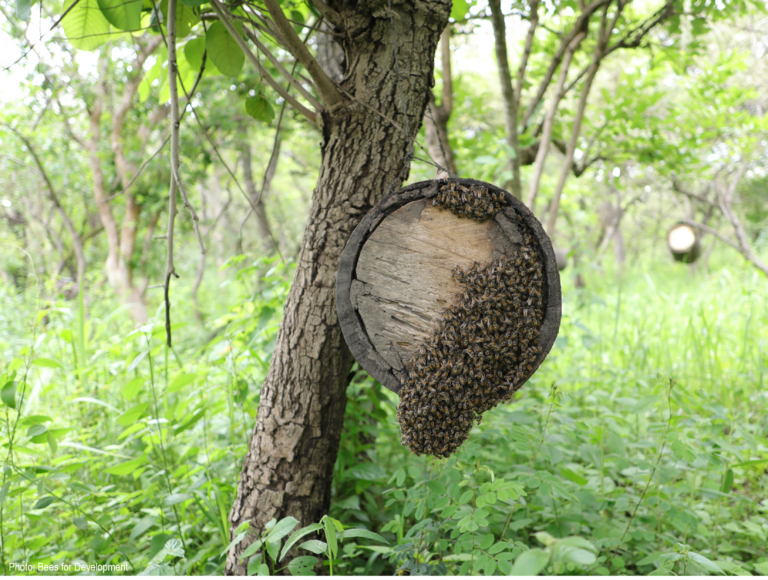Beyond the Jar Part 2:
Making Life Better with Bees

We spoke to Nichola Bradbear and Jenny Handley about their work at Bees for Development, a charity that uses beekeeping as a means to alleviate poverty by funding beekeeper training in rural communities around the world. Nichola founded the organisation 30 years ago and is currently CEO. Jenny is Head of Fundraising and Communications.
Why was Bees for Development set up?
Prior to setting up the organisation, beekeeping as a tool for development wasn’t really a topic, it wasn’t on the agenda and it was very hard to persuade people that beekeeping was more than just a middle-class hobby, which was the attitude in the UK at the time, but actually a source of rural livelihood all around the world. Even in countries where beekeeping is hugely important and practised by a large number of people, it is often on a small scale and so is frequently sidelined by the central government and neglected as a source of livelihood for the poorest people. However it’s those small scale activities that enable poor people to build a livelihood portfolio and make a resilient life, having a large number of things that they do on a small scale so they’re not reliant on just one source of income; therefore beekeeping is fantastically important. So, we were the first organisation anywhere focused on beekeeping for development.
Has beekeeping always been a part of your life? What led you on that journey?
I had worked in this field for ten years before I started Bees for Development, so I’d already learned a lot about what was going on and seen many projects, good ones and bad ones, and was very focused on what we could do. I was really interested in poverty alleviation and finding livelihoods for people in deprived communities. Good things were being done but nobody was doing good things around bees and beekeeping. People in the UK just dismissed beekeeping, not seeing it as a form of mainstream agriculture. But in other countries it is absolutely a part of mainstream agriculture. So I just thought it was time somebody really talked it up.
What is Bees for Devlopment’s mission?
Our mission is to harness the power of bees to achieve less poverty and more biodiversity. There’s no shortage of people in the poorest countries who need to find a way to earn a living and beekeeping is a good way for them to do it. But in many cases what governments are doing is not helpful to these communities. For example in Ethiopia the government is still promoting increased use of pesticides which are actually killing beekeepers’ bees. Our work is about promoting indigenous knowledge and indigenous skills, and not introducing external inputs. We provide training and share knowledge about sustainable apiculture and nature-based beekeeping − that is why our logo is a tree with a hive hanging in it.
How does the organisation work?
We have a small staff base here in Monmouth, South Wales but we fund and manage partner organisations in Ethiopia, Ghana and Uganda, so we also have colleagues based in those countries. They’re the ones who are running the project on the ground and doing the work on a daily basis, with guidance and support from us. We’ve also been working with our partner organisations for more than 15 years now. The beekeeping itself is different in different places, for example in northern Ethiopia we’re working with top bar hives, and in Uganda we’re working with fixed comb hives, but these are always made locally from whatever materials that are available and are cost free. We have also set up a resource centre on our website which is free for everybody to access, covering all the different aspects of beekeeping. Nature-based beekeeping is our term and our wider agenda really, we’re not just talking about beehives, we’re talking about responsible beekeeping that is socially viable and fits into rural livelihoods in a sustainable way. Many well meaning people do the wrong thing by trying to teach British or European beekeeping in a country where it’s really not appropriate. That kind of beekeeping is completely different, and they may see local beekeeping but not appreciate that it’s already perfect beekeeping that has evolved over a long time and fits the bees and it fits the people. Very often the best thing is to leave alone rather than intervene, it’s tempting to intervene and tell people they’re doing it wrong but actually, they’re actually doing it right, always. We were a very tiny organisation and we wish we were much bigger and could do much more because there’s huge demand.
What is sustainable apiculture and how do you promote it?
If you’re going to work with extremely poor, disadvantaged people living in terrible situations, what you do with them has to be sustainable, of course. We don’t give any equipment, we give the skills for people to make their own equipment so they can continue scaling up what they do long after we’ve left. It is low cost, or no cost, beekeeping. They do it without any capital to get started and without relying on any external inputs, which is a big problem with many donor-funded projects – where there were donor inputs but the minute the donor goes home the work finishes. Wherever we work the beehives are made from local materials. In the Afram Plains of Ghana they’re made from borassus palm tree trunks which are hollow and cost nothing, very convenient beehives. But in Ethiopia, it’s not a forested area and there are no hollow tree trunks, there are very few trees – that’s part of the problem, it’s horribly deforested, so hives are weaved using raffia. A beehive is just a container for bees to live in so you can make it from whatever you have to hand. You don’t need imported timber, you don’t need nails or wire; what you do need is things that are available in the villages. We always recommend the best way to start is with a swarm because it’s like a healthy brand new baby and they are freely available in nature. Another thing about the way we work is that we don’t just go in there for a couple of weeks and leave, we’re there for a long time, for years, so we build really good relationships. Each person we support, we train them in beekeeping and stay with them for about two years till they’ve done one or two rounds of harvesting and trading the produce and are creating income from their beekeeping.
What is the impact that your work has on communities and on people’s livelihoods?
It has a massive impact, in lots of different ways. I think one of the main things is it stops a lot of people migrating to the towns and cities, which then keeps communities together. It gives people from lots of different groups: young women, mothers, people that have had problems with where they have settled or who have had to be moved on, an opportunity to earn money. It can also help people with disabilities, it just opens up a new world. It’s a way of empowering people, because if they’re able to produce the materials and goods they need, then they’re earning money from it and their children are then going to school. Not only that, it also helps protect the environment, and we are currently running a campaign called ‘Bees Save Forests.’ In Ghana, a lot of people we have worked with had previously turned to the charcoal industry, that’s how they made their money, but unfortunately that creates wildfires and it’s not great for the environment. Beekeeping is a great alternative and when these people start their training they begin to see that by looking after their natural world, the bees can continue foraging and provide them with an income in return. In Ethiopia, we’ve done a lot of reforesting and rewilding as well. Through this, the beekeepers are reclaiming their land, and by replanting they’re again seeing the benefit of increased honey yields and are making a living through that, so there’s definitely a direct correlation. Once they are onboard and they see the benefit, they want to do even more to protect their environment.
How can consumers of honey act more responsibly?
Buying local honey and supporting your local beekeepers. We have such a demand for driving the prices down and making things cheap, not just with honey but across the whole food chain, price drives everything in the UK. If you can buy local honey, yes you’re paying a little couple of pounds extra but you’re benefiting so much more. If more people buy better quality produce then hopefully then demand will fall away for the cheaper volume and imports.
How can people engage with the organisation and support you?
We run nature-based courses for people in skep making and on strengthening livelihoods by means of beekeeping. We try to engage as much as we can because at the end of the day these people are going to hopefully support us. We sell local honey in our shop as well as some Zambian and Ethiopian honey, it’s a very small part of what we do but it gives us a presence on the high street and an opportunity for people to come and talk to us. People can donate, volunteer, and we have lots of videos that go into the work that we do that people can watch, or check out our resource centre if you’re really interested in the beekeeping side.
Discover more about Bees for Development:
Website – https://www.beesfordevelopment.org/
Facebook and Instagram – @beesfordevelopment
Twitter – @beesfordev
Bees for Development will be hosting a garden party at London’s Marlborough House on the 14th of June to raise funds and awareness for the work of the charity as well as celebrating the importances of bees and getting them on the agenda! Tickets are on sale at www.bees.org.


